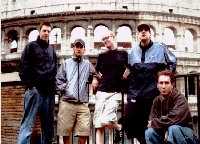In the halcyon days of 1996, Boston hardcore was a dirty term. If self-applied, it relegated you to the dusty confines of corny nostalgia and adolescent identity crisis. But there were believers. An unsung group of olderish, foolish romantics who still identified with passionate three- chord bludgeon. They made their debuts in dusty basements and practice spaces. They self- released demos on cassettes. It was a wonderful example of pre-internet underground- acutely in tune with the ethos of hardcore days gone by. Bane emerged at this time.
For quite a while, any so-called hardcore band from Boston wore the red badge of reactionary politics forged by such stalwarts as Slapshot, and of course, before them, SSD, The FUs and DYS. Overlooked were the roads traveled by Eye for and Eye, Dive, Kingpin and Backbone- bands that didn’t exactly vibe with the first-wavers. These were bands that infused melody, skaterock and metal with traditional hardcore. Some were more successful than others, but the feeling was the same: nothing was essentially “off limits”.
Bane was the brainchild of Aaron Dalbec, who formed the band in 1994 to counter the recent breakup of another band he had been playing with, Converge. Originally called Gateway, Bane in its nascent stages was the antithesis of the direction Converge had taken, which was more experimental and metallic. The Bane outline was raw and surging, taking cues from bands like Judge, but meshing that with the intricate likes of Burn. Off and on for a couple of years, Dalbec played the embryonic Bane songs with various locals in practice spaces and basements. Singers were scarce.
In the summer of ‘95, the local band Backbone played a one off reunion show, which had everyone talking. People were talking in particular about the magnetic performance of their front man, Aaron Bedard. Through mutual friends, Dalbec approached Bedard about possibly singing for Bane. Thrilled at the idea, Bedard quickly penned several song lyrics that would become the first that would officially be for Bane. Things moved quickly, and the end of ‘95 yielded a five-song demo. The acquisition of Pete Chilton, a young fellow from the nearby town of Auburn, for bass duties soon followed. Through him, the Aarons were introduced to a local naer-do-well, Zach Jordan from the notorious band Barrit, who was soon filling out the sound on second guitar.
Through a series of cathartic, chaotic local shows, the band soon became a household name in MA. Kids from as far away as Plymouth were driving to Worcester to witness the live onslaught. Over the course of a year, the band self-released two EP’s and rapidly went through three to four pressings- garnering the attention of several labels. Though there was the momentum of national acclaim for Bane, they were still at a loss for a full time drummer. Damon Bellorado had decided to devote his time to Converge only. Ben Chused agreed to play on their EVR debut, but couldn’t tour because of obligations with Ten Yard Fight. Luckily, at a show earlier in the year, the Aarons had both noticed the drumming skills of a 19 year old red-head named Nick Branigan who was then playing for Close Call. Long story long, they recruited Branigan for their first US tour in the summer of 1998, headlining over Saves the Day.
They spent the next year writing what would become their debut full-length, “It All Comes Down to This”. The band honed in on ten solid songs that would stand the test of time. This was unprecedented for a hardcore band, who usually re-records their demo with four or five new songs. They were determined to record an unconventional hardcore record, and settled into Steve Austins’ Austin Enterprises in Clinton, MA in June of 1999.
By winter 2000, Bane had crossed the US four times, and had completed a six week headlining tour of Europe. By summer 2001, Bane had completed writing their 2nd LP “Give Blood”, and headed to Beltsville, MD to record with Brian McTernan. The result was their most potent and unfettered recording to date. Finally, Bane sounded in the studio like they did live, and the response couldn’t have been better.
They set out to tour with Agnostic Front in the infamous fall of 2001, and over the next four years, they would share the stage with a diverse roster of bands, from Dashboard Confessional and Thursday, to Shadows Fall, Good Riddance and Hatebreed, whom Bane accompanied on a full US tour. People became rabid and devoted, and they became devoted to people. Some got married, some didn’t.
Unexpectedly and expectedly, Nick left the band in 2003 to pursue other interests. Promptly, the band recruited the drumming workhorse known as Bob Mahoney. They filled obligations and Bob filled shoes (quite ably, might I add), completing a full five week US tour with the Promise (who shared Bane’s van after their own caught fire), and a two week tour of Japan in April of 2004. The band continues to tour and write music, “The Note” being their first full length since “Give Blood”, again recorded with Brian McTernan. They will single handedly eradicate sub-mental violence and exclusionary labels with positivism and powerful music. They will continue to do so until every voice is heard screaming all the way to the back of the room. They are Boston hardcore, until the last fucking note.
- Nicholas Branigan Cambridge, Massachusetts. March 10th, 2005
